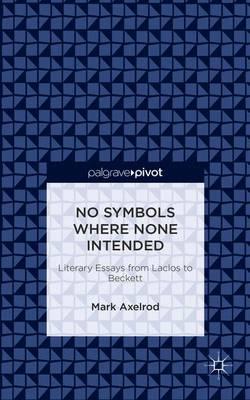Overview
An homage to Nabokov's Lectures on Literature, this collection of essays sheds new light on canonical authors such as Ibsen, Beckett, and Strindberg. Using style and structure as the connective thread, Mark Axelrod joins a wide and deep conversation on writers on writing.
Full Product Details
Author: M. Axelrod
Publisher: Palgrave Macmillan
Imprint: Palgrave Pivot
Dimensions:
Width: 14.00cm
, Height: 1.30cm
, Length: 21.60cm
Weight: 0.286kg
ISBN: 9781137456090
ISBN 10: 1137456094
Pages: 99
Publication Date: 28 July 2014
Audience:
Professional and scholarly
,
Professional & Vocational
Format: Hardback
Publisher's Status: Active
Availability: In Print

This item will be ordered in for you from one of our suppliers. Upon receipt, we will promptly dispatch it out to you. For in store availability, please contact us.
Reviews
"""What is vital reading, vital generosity, and the courage to make these two, now often submerged crafts, immediately present? Here in Mark Axelrod's essays these acts are given a generative and imaginative intricacy, beautifully shaped and recorded. They evoke transformation, discovery, and a repository of experienced consciousness that has the nerve to both speak and challenge and return these things to their precarious wonders."" -Author of How the Night is Divided and A HalfMan Dreaming ""In No Symbols Where None Intended, Mark Axelrod deconstructs the dramatic dimension of Laclos, Turgenev, and Beckett. Continuing Nabokov and Benjamin's rare tradition of critical virtuosity, Axelrod takes his nuanced arguments, themselves a wonder of structure and style, through a grand detour of original insights and never fails to bring them back home to unexpected and illuminating conclusions."" - Pablo Baler, Associate Professor of Latin American Literature, California State University, Los Angeles, USA"
What is vital reading, vital generosity, and the courage to make these two, now often submerged crafts, immediately present? Here in Mark Axelrod's essays these acts are given a generative and imaginative intricacy, beautifully shaped and recorded. They evoke transformation, discovery, and a repository of experienced consciousness that has the nerve to both speak and challenge and return these things to their precarious wonders. -Author of How the Night is Divided and A HalfMan Dreaming In No Symbols Where None Intended, Mark Axelrod deconstructs the dramatic dimension of Laclos, Turgenev, and Beckett. Continuing Nabokov and Benjamin's rare tradition of critical virtuosity, Axelrod takes his nuanced arguments, themselves a wonder of structure and style, through a grand detour of original insights and never fails to bring them back home to unexpected and illuminating conclusions. - Pablo Baler, Associate Professor of Latin American Literature, California State University, Los Angeles, USA
What is vital reading, vital generosity, and the courage to make these two, now often submerged crafts, immediately present? Here in Mark Axelrod's essays these acts are given a generative and imaginative intricacy, beautifully shaped and recorded. They evoke transformation, discovery, and a repository of experienced consciousness that has the nerve to both speak and challenge and return these things to their precarious wonders. -Author of How the Night is Divided and A HalfMan Dreaming In No Symbols Where None Intended, Mark Axelrod deconstructs the dramatic dimension of Laclos, Turgenev, and Beckett. Continuing Nabokov and Benjamin's rare tradition of critical virtuosity, Axelrod takes his nuanced arguments, themselves a wonder of structure and style, through a grand detour of original insights and never fails to bring them back home to unexpected and illuminating conclusions. - Pablo Baler, Associate Professor of Latin American Literature, California State University, Los Angeles, USA
Author Information
Mark Axelrod is a Professor in the Department of Comparative Literature at Chapman University, USA.




